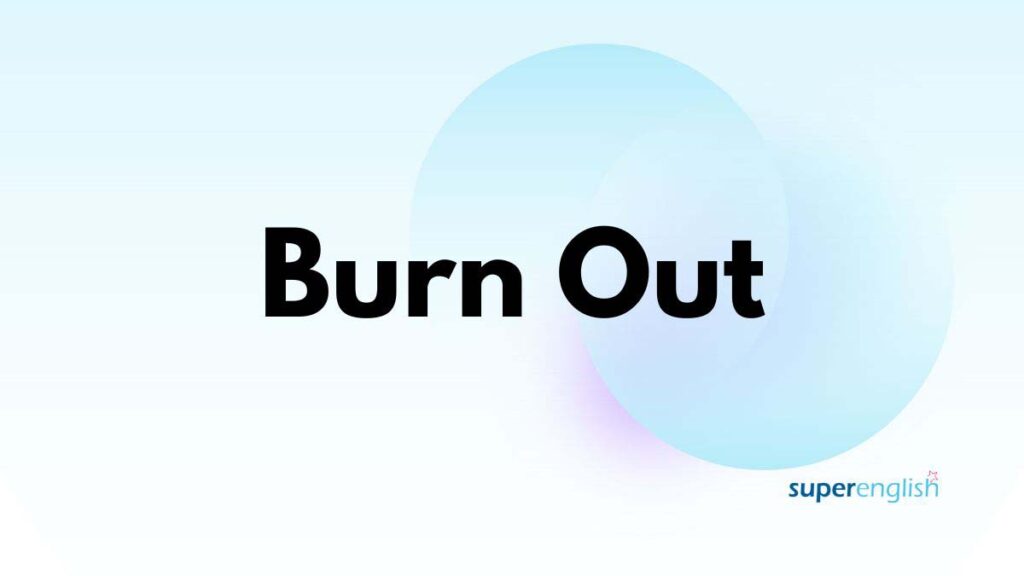
Table of Content
- Definition of Burn Out
- Forms and tenses of Burn Out
- Meaning and usage of Burn Out
- Common expressions with Burn Out
- The list of synonyms for Burn Out
- The list of antonyms for Burn Out
- 50 Example sentences with Burn Out
- The questions are related to the phrasal verb Burn Out
Definition of “burn out”: the exact definition of the phrasal verb “burn out” and how it is used in a sentence
The phrasal verb “burn out” means to become exhausted, typically from overwork or excessive stress. It can also refer to the failure of a machine or device due to overheating or overuse. Here are a few examples of how it can be used in a sentence:
- To describe the feeling of being exhausted or overwhelmed:
“I’ve been working so hard lately that I’m starting to burn out. I need to take a break and relax.”
- To describe the failure of a machine or device:
“The motor in our old blender finally burned out. We’ll have to buy a new one.”
- To describe the ending of a relationship or personal interest:
“After years of working as a lawyer, he realized that he had burned out on the profession. He decided to switch careers.”
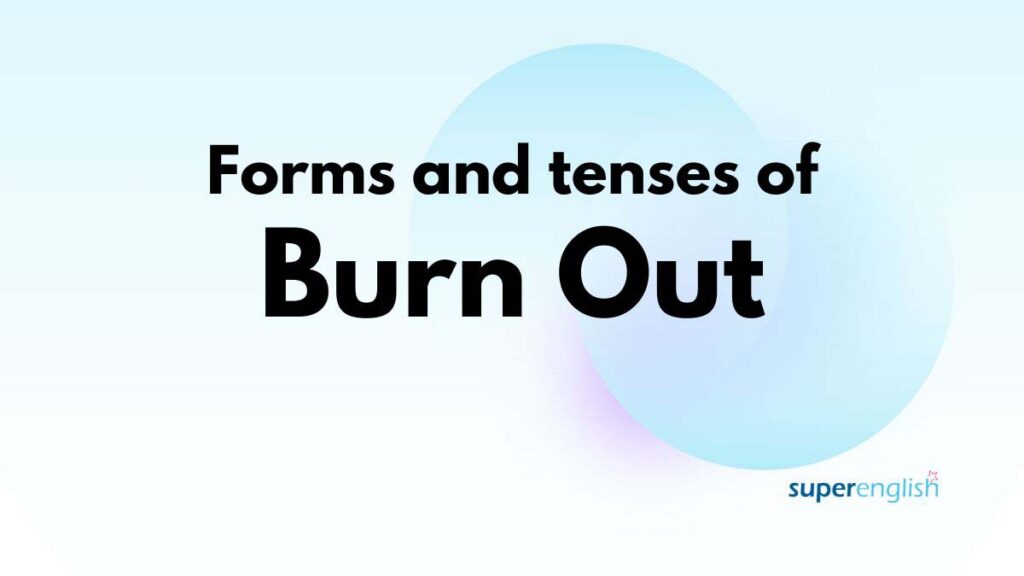
Forms and tenses: the different forms and tenses of “burn out” and give examples of how to use each one
The phrasal verb “burn out” is a separable verb, which means that the particle “out” can be placed either before or after the direct object in a sentence. In its present tense form, “burn out” can be conjugated as “burns out” in the third-person singular, or as “burn out” in all other cases. For example:
Present tense, third-person singular: “She burns out quickly when she doesn’t get enough rest.”
Present tense, first-person singular: “I burn out when I work too many hours.”
Present tense, second-person singular or plural: “You burn out when you don’t take care of yourself.”
In the past tense, “burn out” can be conjugated as “burnt out” in all cases. For example:
Past tense, third-person singular: “She burnt out quickly on the job.”
Past tense, first-person singular: “I burnt out after working too many hours.”
Past tense, second-person singular or plural: “You burnt out from the stress of the job.”
In the future tense, “burn out” can be conjugated as “will burn out” in all cases. For example:
Future tense, third-person singular: “She will burn out if she doesn’t take a break soon.”
Future tense, first-person singular: “I will burn out if I don’t start taking better care of myself.”
Future tense, second-person singular or plural: “You will burn out if you don’t find a way to manage your stress.”
In addition to the present, past, and future tenses, “burn out” can also be used in the present progressive tense, which is used to describe actions that are ongoing or in progress at the present time. In the present progressive tense, “burn out” can be conjugated as “is burning out” in the third-person singular, or as “are burning out” in all other cases. For example:
Present progressive tense, third-person singular: “She is burning out from working long hours every day.”
Present progressive tense, first-person singular: “I am burning out from the constant pressure and stress at work.”
Present progressive tense, second-person singular or plural: “You are burning out from the demands of your job.”
In the past progressive tense, “burn out” can be conjugated as “was burning out” in the third-person singular, or as “were burning out” in all other cases. For example:
Past progressive tense, third-person singular: “She was burning out from the constant pressure at work.”
Past progressive tense, first-person singular: “I was burning out from the long hours and high demands of my job.”
Past progressive tense, second-person singular or plural: “You were burning out from the stress and lack of support at work.”
In the future progressive tense, “burn out” can be conjugated as “will be burning out” in all cases. For example:
Future progressive tense, third-person singular: “She will be burning out if she doesn’t start taking better care of herself.”
Future progressive tense, first-person singular: “I will be burning out if I don’t find a way to manage the stress of my job.”
Future progressive tense, second-person singular or plural: “You will be burning out if you don’t find a way to balance your work and personal life.”
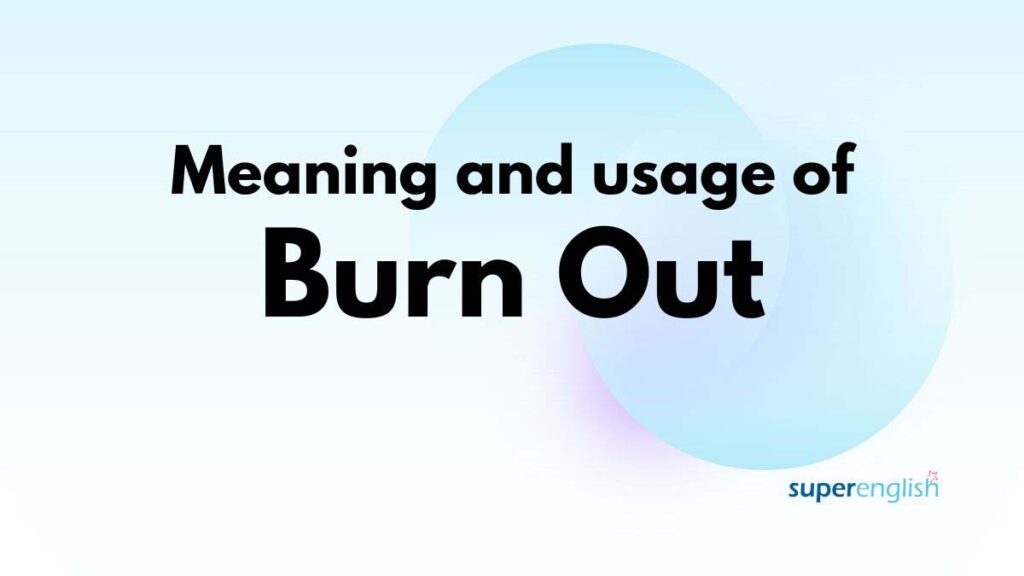
Meaning and usage: the different meanings and uses of “burn out” and examples of how to use it in different contexts
As a phrasal verb, “burn out” has multiple meanings and uses, depending on the context in which it is used. Below are some possible meanings and uses of “burn out,” along with examples of how to use it in different contexts:
- To experience physical and emotional exhaustion resulting from prolonged stress or overwork: This is the most common meaning of “burn out,” and it is used to describe the state of being overwhelmed and unable to continue functioning at the same level, often due to the demands of a job or other situation. For example: “She was feeling burnt out from working long hours every day.”
- To stop functioning or become inoperable due to excessive heat or electrical overload: In this context, “burn out” is used to describe a situation in which a device or appliance stops working due to overheating or excessive electrical current. For example: “The light bulb burnt out because it was too hot.”
- To lose interest or enthusiasm for something that was once enjoyable: In this context, “burn out” is used to describe the loss of passion or enthusiasm for something that was once enjoyable or meaningful. For example: “He burnt out on his job and decided to pursue a different career.”
- To cause someone to experience physical and emotional exhaustion: In this context, “burn out” is used to describe a situation in which someone else’s actions or behavior cause another person to experience burnout. For example: “The demanding nature of her job was burning her out.”
- To extinguish a fire or light source: In this context, “burn out” is used to describe the process of extinguishing a fire or light source. For example: “He used a fire extinguisher to burn out the flames.”
In all of these contexts, “burn out” is a separable verb, which means that the particle “out” can be placed either before or after the direct object in a sentence. For example: “She was burning out from the constant pressure at work” and “She was burning from the constant pressure at work out.”
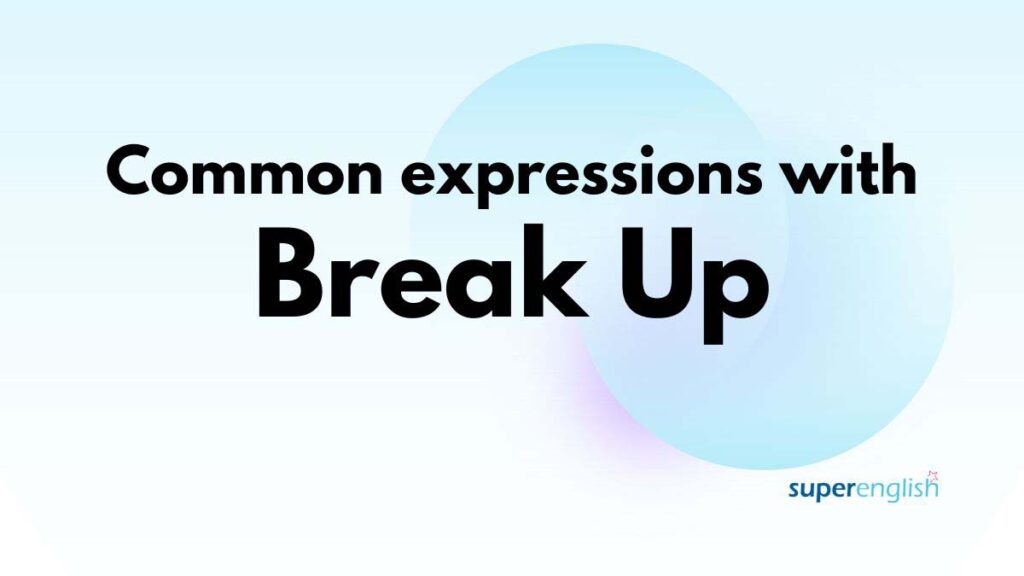
Common expressions with “burn out”: some common expressions that use “burn out” and explain their meanings and uses
There are several common expressions that use the phrasal verb “burn out,” each with its own specific meaning and use. Some of the most common expressions that use “burn out” are:
- To burn out on something: This expression is used to describe the loss of interest or enthusiasm for something that was once enjoyable or meaningful. For example: “She burnt out on her job and decided to pursue a different career.”
- To burn someone out: This expression is used to describe a situation in which someone else’s actions or behavior cause another person to experience burnout. For example: “The demanding nature of her job was burning her out.”
- To burn out the competition: This expression is used to describe a situation in which someone or something outperforms or outshines others in a competition or other situation. For example: “He was able to burn out the competition with his exceptional skills and abilities.”
- To burn out the lights: This expression is used to describe the process of extinguishing a light source, often by turning off the power or removing the light bulb. For example: “She burned out the lights before going to bed.”
In all of these expressions, “burn out” is used as a separable verb, with the particle “out” placed either before or after the direct object in a sentence. For example: “She burnt out on her job” and “She burnt her job out.”
The list of synonyms for “Burn Out”
These words can be used interchangeably with “burn out” to convey the idea of becoming exhausted, depleted, or fatigued due to prolonged stress, overwork, or intense activity.
Here is a list of synonyms for “burn out”:
- Exhaust
- Deplete
- Drain
- Wear out
- Fatigue
- Overwork
- Tire
- Fizzle out
- Run down
- Break down
- Collapse
- Flag
- Enervate
- Weaken
- Use up
- Consume
- Sap
- Diminish
- Waste away
- Flag
The list of antonyms for “Burn Out”
These words represent concepts opposite to “burn out” and imply actions of recharging, revitalizing, or restoring energy and enthusiasm.
Here is a list of antonyms for “burn out“:
- Energize
- Invigorate
- Revitalize
- Refresh
- Rejuvenate
- Renew
- Recharge
- Revive
- Regenerate
- Restore
- Renew
- Thrive
- Flourish
- Vitalize
- Inspire
- Stimulate
- Activate
- Enliven
- Motivate
- Excite
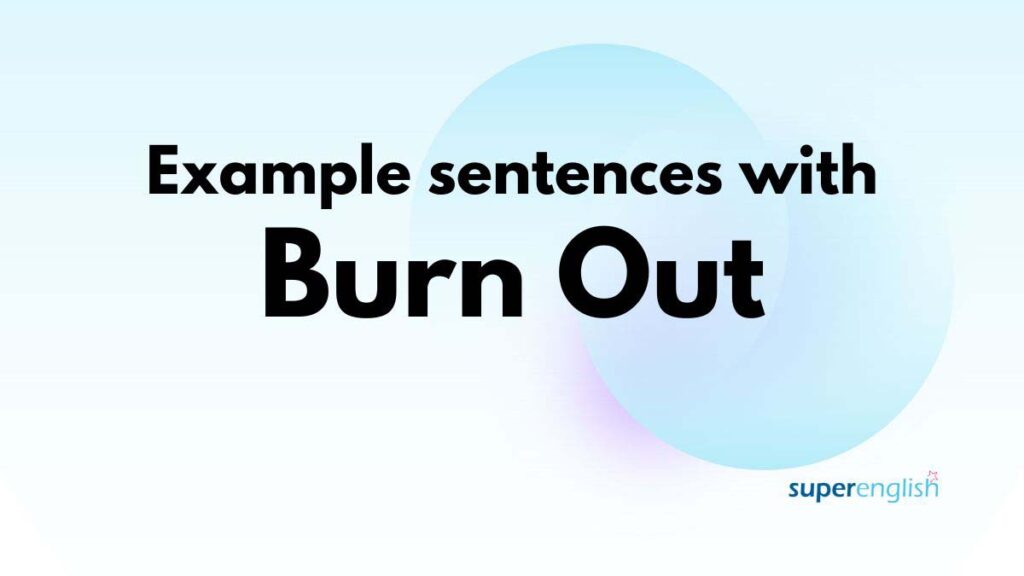
50 Example sentences with Burn Out
- She was feeling burnt out from working long hours every day.
- The new project was so demanding that it caused him to burn out quickly.
- The constant stress and pressure at work led to burnout for many employees.
- He was starting to burn out and needed a break from the hectic pace of his job.
- The company offered burnout prevention workshops to help employees cope with stress.
- She had been working so hard that she was at risk of burning out.
- He tried to avoid burnout by taking regular breaks and practicing self-care.
- The company provided support and resources to help employees prevent burnout.
- She was surprised by how quickly she burnt out on the new job.
- The manager noticed that his team was burning out and took steps to reduce their workload.
- She realized that she needed to take time off to avoid burning out.
- He was able to recover from burnout by making changes to his work habits and lifestyle.
- She was worried that her colleagues were burning out and not getting the support they needed.
- The company implemented a burnout prevention program to help employees maintain a healthy work-life balance.
- He was feeling burnt out from his job and decided to take a sabbatical.
- She realized that she was burning out and needed to make some changes to her work routine.
- The company provided counseling and other resources to help employees cope with burnout.
- He was able to overcome burnout by reducing his workload and focusing on his mental health.
- She was worried that she was burning out and sought help from her supervisor.
- The company organized regular wellness activities to help prevent burnout among employees.
- He was feeling burnt out and needed to take some time off to recharge.
- She realized that she was at risk of burnout and made an effort to prioritize self-care.
- The company provided training on stress management to help employees prevent burnout.
- He was able to recover from burnout by making changes to his daily routine and seeking support.
- She was concerned that her co-workers were burning out and offered to help where she could.
- The company offered flexible work arrangements to help employees avoid burnout.
- He was feeling burnt out and decided to take a step back from his responsibilities for a while.
- She realized that she needed to make changes to her work habits to avoid burning out.
- The company provided regular opportunities for employees to connect and support each other to prevent burnout.
- He was able to overcome burnout by learning to say no to unreasonable demands and prioritizing his own well-being.
- She was worried that she was burning out and sought advice from a professional.
- The company implemented a program to help employees identify and address the signs of burnout.
- He was feeling burnt out and decided to change jobs in order to reduce his stress levels.
- She realized that she needed to make time for herself in order to avoid burning out.
- The company offered counseling and therapy services to help employees cope with burnout.
- He was able to recover from burnout by focusing on his physical health and practicing mindfulness.
- She was worried that her team was burning out and suggested ways to improve their work-life balance.
- The company provided resources and support to help employees prevent and recover from burnout.
- He was feeling burnt out and needed to take a break in order to recharge and refocus.
- She realized that she was burning out and started to prioritize her mental and emotional health.
- The company offered workshops and training on stress management and burnout prevention.
- He was able to overcome burnout by making changes to his work environment and seeking support from his colleagues.
- She was worried that she was burning out and sought help from a therapist.
- The company implemented policies to promote a healthy work-life balance and prevent burnout.
- He was feeling burnt out and decided to reduce his hours in order to manage his stress levels.
- She realized that she needed to prioritize self-care in order to avoid burning out.
- The company provided resources and support to help employees recognize and deal with burnout.
- He was able to recover from burnout by making time for hobbies and activities that brought him joy.
- She was worried that her colleagues were burning out and suggested ways to support each other.
- The company implemented a comprehensive burnout prevention program to help employees maintain their mental and physical health.
The questions are related to the phrasal verb ‘Burn Out’
- I was so busy with work that I ___________. (burned out)
- After years of working long hours, he finally ___________. (burned out)
- She was ___________ from trying to juggle her job and her family responsibilities. (burning out)
- The teacher was ___________ from dealing with unruly students all day. (burning out)
- The company was ___________ due to poor management and lack of resources. (burning out)
- I can see why you would ___________ from dealing with that much stress. (burn out)
- The marathon runner ___________ after running for 26 miles. (burned out)
- The candle ___________ and went out. (burned out)
- He ___________ his energy on the project, but it still wasn’t finished on time. (burned out)
- She ___________ from working two jobs and going to school full-time. (burned out)
- The car engine ___________ and stopped working. (burned out)
- The company was ___________ by the economic downturn. (burning out)
- The relationship ___________ due to lack of communication and trust. (burned out)
- The athlete ___________ after training for hours every day. (burned out)
- The computer ___________ and stopped functioning. (burned out)
- The employee ___________ from being overworked and underpaid. (burned out)
- The relationship ___________ due to a lack of effort and attention. (burned out)
- The athlete ___________ after competing in multiple tournaments in a short period of time. (burned out)
- The company ___________ due to poor financial planning and decision making. (burned out)
- She ___________ from trying to do too much at once. (burned out)
